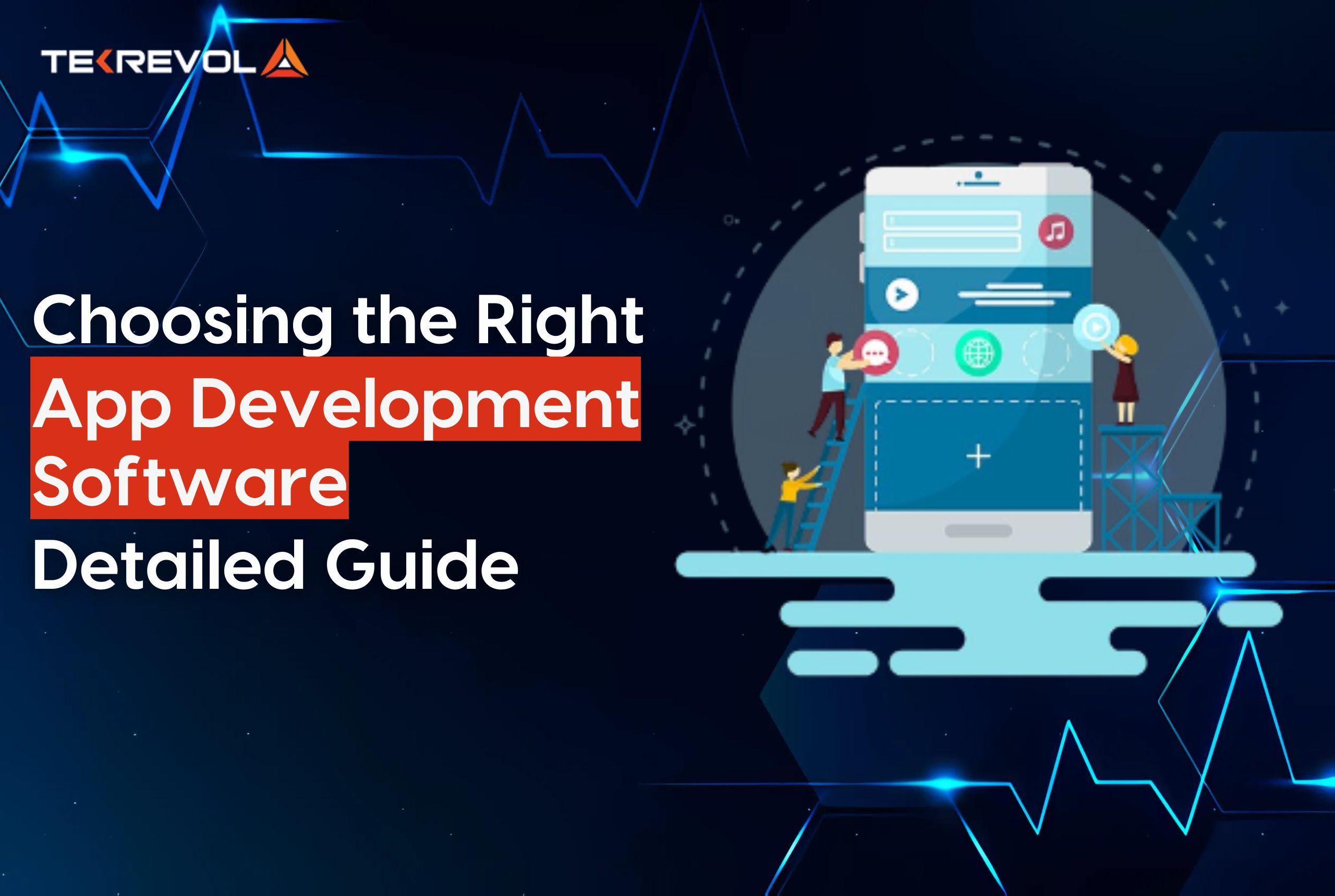As IT enterprises rush to modernize legacy systems and improve efficiency, the enterprise software market is expected to reach an incredible $292 billion by 2024. This rapid growth signals an increasing urgency for CIOs and business leaders to close the gap between traditional systems and their modern market needs.
But first of all, before we dive into enterprise software development, the right question would be: What defines enterprise software? What differentiates it from ordinary software development?
The best enterprise software aligns with your business’s strategic goals, integrates smoothly with existing infrastructures, and is scalable to meet future demands.
This blog will shed light on the essential features of enterprise software development and its significant role in shaping the future of businesses.
- Are You Ready to Tackle Market Complexity with Next-Gen Solutions?
- Let us help you develop advanced enterprise applications that drive success.
- Get Started Now!
What is Enterprise Software?
Enterprise software is a package of several applications developed specifically to make the complex operations of large organizations easier and more efficient. This kind of software covers multiple business needs like ERP (Enterprise Resource Planning), CRM (Customer relationship management), accounting systems, and supply chain logistics management.
Enterprise software becomes a cohesive system with the integration of all these diversified functions that makes organizational activities more convenient, reduces redundancy, and enables informed decisions based on current data.
In addition, the worldwide enterprise software market is supposed to be around USD 519.88 billion in 2030. It is huge growth, depicting the growing demand for advanced software solutions among large enterprises to remain competitive amid an increasingly digital landscape.
Some Essential Features of Enterprise Software Development
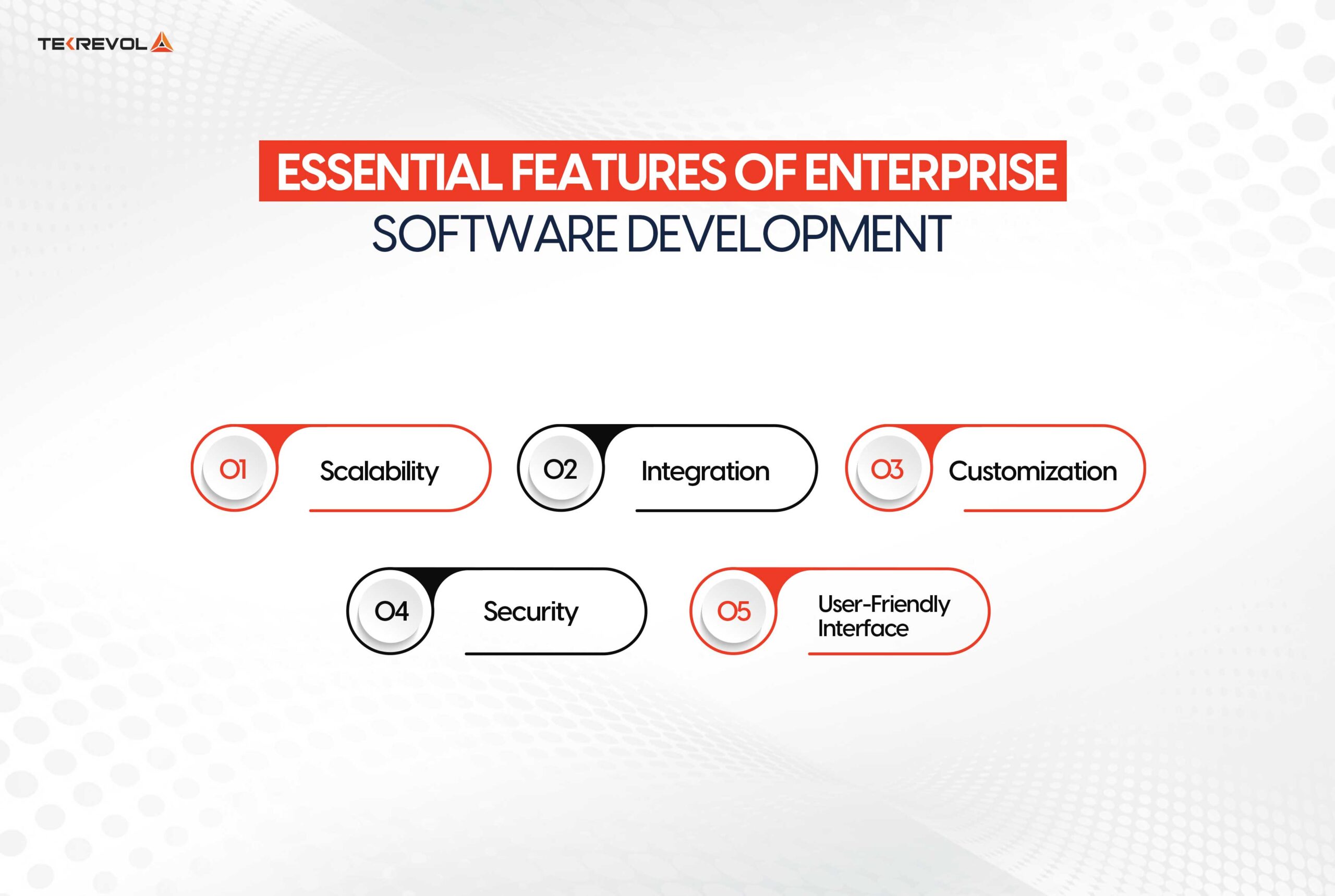
Scalability:
Enterprise software is designed to scale with an organization. As the needs of an organization grow, so can the solutions. Thus, these solutions expand to meet the increased workload and large volumes of data in an optimal performance manner.
Integration:
The best enterprise software integrates with existing systems and applications within an organization. This ensures smooth data exchange between departments, which creates more collaboration and operational efficiency.
Customization:
This is one of the significant advantages enterprise software development has. Its flexibility allows businesses to adjust the software according to the specific needs of the organizations, including custom workflows, reporting tools, and specialized features tailored to their specific operations.
Security:
Big organizations with sensitive information are more inclined toward enterprise software development as far as security matters are concerned. It develops strong protection regarding the breach or unauthorized access, therefore ensuring integrity and confidentiality regarding data.
User-Friendly Interface:
A streamlined and easy interface helps one find one’s way in the system with ease, which means that learning would not be too time-consuming with overall productivity going much higher as a result.
An Overview of Enterprise Software Development
Enterprise software development includes building inclusive software that fits big firms. The processes developed, including the whole spectrum, integrate customer relationship management and business intelligence to carry out online payment processing and accounts through order management operations.
Through the creation of enterprise software, many issues experienced in large enterprises can be addressed. Some of these challenges include: data security and privacy which seeks to reduce incidents of data breach, budget control, internal communication, and employee experience (EX).
The major goal of enterprise software development is to support business processes, eliminate time-consuming routine work, improve cooperation between employees, increase productivity, and achieve the maximum ROI.
An increasing number of businesses are turning to app developers in San Francisco for the development of customized Enterprise software that aligns with their business goals. San Francisco’s technology center and innovation hub gives developers access to the newest technologies and market trends. Therefore, they can develop solutions that satisfy both present demands and expectations as well as those of the future.
What Sets Enterprise Software Apart from Other Software?
Enterprise software or Enterprise Application Software (EAS) is designed to cater to the specific needs of large enterprises. Whereas conventional software is created for end-user computing or small-scale problems, enterprise software addresses complex supply chain, sales, and documentation processes across the organizations’ departments.
This corporate software is designed to support large volumes of data and many users, allowing it to be easily integrated into an organization’s structures. It is capable of expansion to accommodate the growing business needs due to the scalability of the SIM, and its enhanced features such as encryption, disaster recovery, and access to critical business data.
In other words, enterprise software is the working frame of large organizations that aims to manage complex processes, improve teamwork, and promote environmental success.
Different Types of Enterprise Software
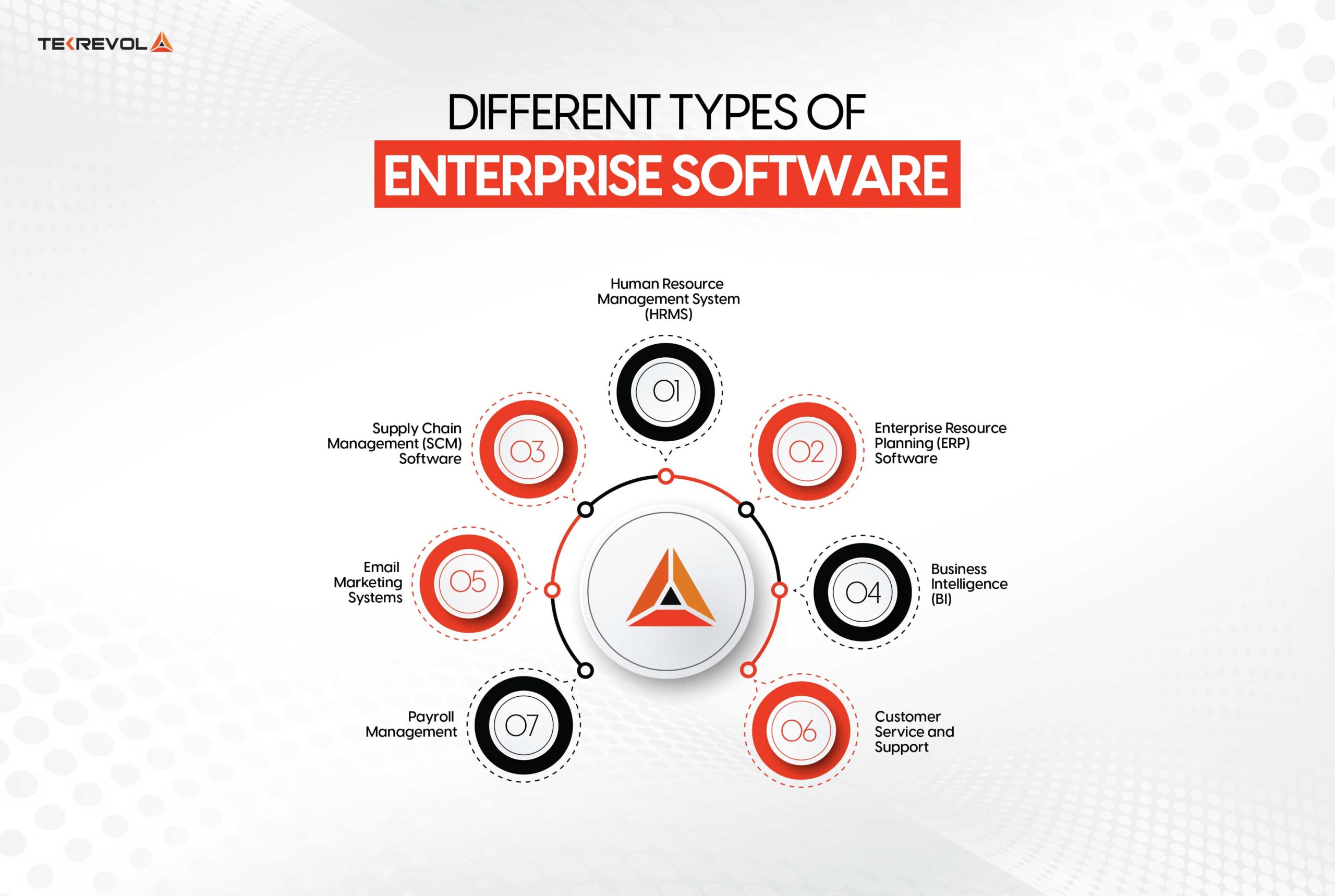
Today, there are several enterprise software applications available for businesses to address the numerous requirements of their operations. Here’s a closer look at some essential types:
Human Resource Management System (HRMS)
Human resource management software is an all-in-one package that can effectively manage the various human resource tasks of an organization such as payroll management, recruitment, talent management and leave management. These functions improve the efficiency of the work, while additionally offering valuable insights, statistics, and performance evaluations on the organizational level adapted to an HRMS system’s needs.
Enterprise Resource Planning (ERP) Software
ERP software is a strong management tool that is used to control and coordinate a wide range of business activities in an organization to achieve efficient and effective data flow as well as proper operation management. Implemented in almost every business sector, ERP improves resource utilization and enables process control and institutionalization of work.
Supply chain management (SCM) software
SCM software helps to plan corporate operations and processes such as material procurement, manufacturing, and delivery to end users. By providing better control and visibility of SCM activities, this software eliminates redundancies, cuts costs, and shortens the time to delivery.
Business Intelligence (BI)
BI software collects and provides information required for decision-making, making the process fast within organizations. Through the use of automated data analysis, companies are able to obtain information on performance and market trends to support BI in strategic planning and growth outcomes.
Email Marketing Systems
Email marketing software sustains the customers’ interactions as it relates to continuous communication and marketing promotions. It facilitates organizations to relay messages to customers, communicate customized messages, and develop closeness due to constant engagements.
Customer Service and Support
Customer service software is a tool that enables businesses to address customers’ issues, thus promoting support services through email, live cycles, and any phone call. By improving the response rate, customer relations, and satisfaction these tools contribute to trust and customer loyalty in the business.
Payroll Management
The payroll software calculates employee wages, tax deductions, and benefits. The program ensures tax compliance, increases transparency, and keeps employees informed about compensation and benefits, building trust and efficiency within the organization.
Top Reasons to Invest in Enterprise Software for Your Business
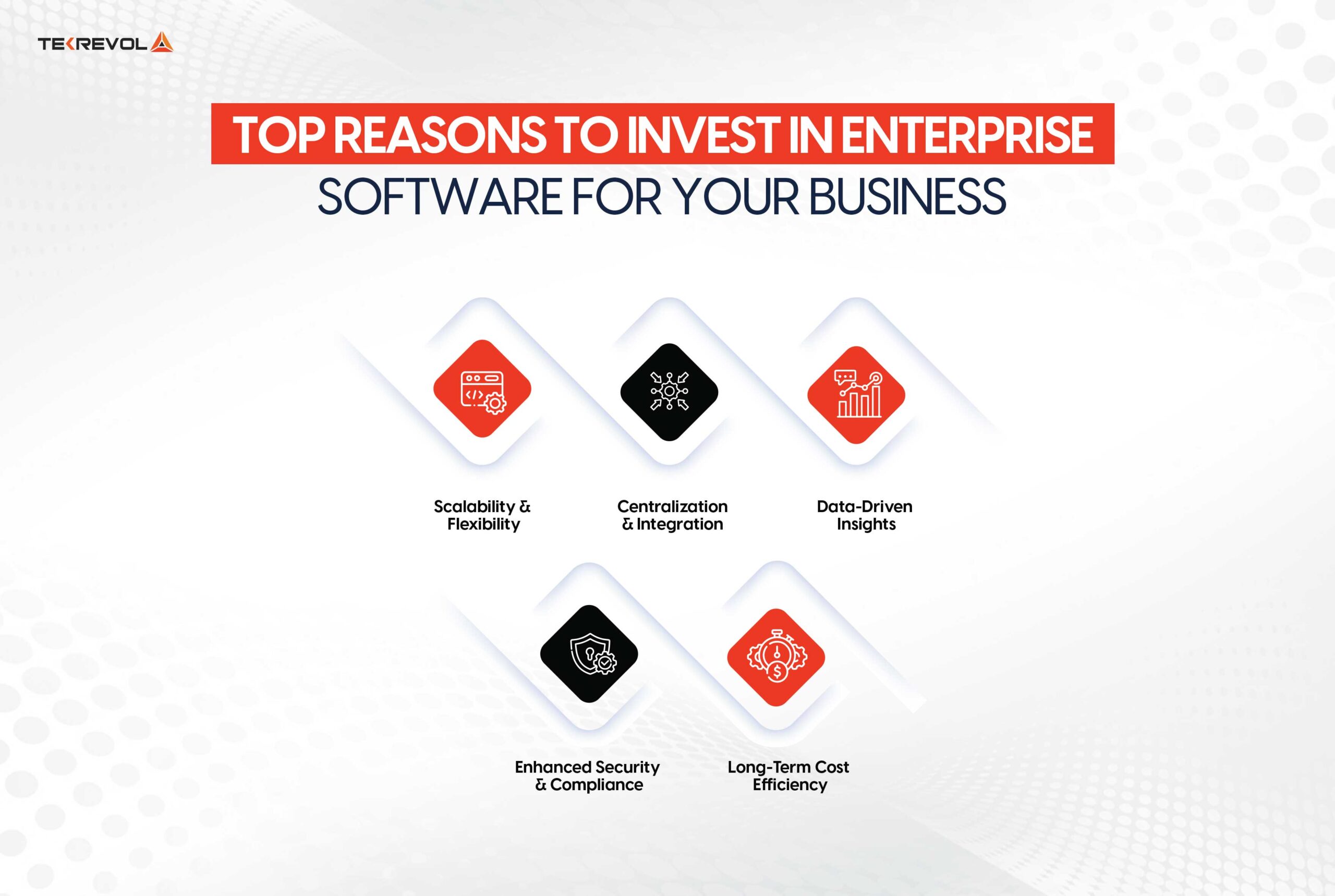
Sometimes, it is possible to buy ready software that can be adapted to one’s needs, but it rarely meets the requirements of large-scale businesses in terms of the necessary functions and their customization. Here are compelling reasons to consider developing enterprise software for your organization:
1. Scalability and Flexibility
Enterprise software is built to be an integrated part of your business and designed to grow with it. It can timely process primarily and secondarily various data volumes and user-increasing demands without degrading its performance. Besides, it also has numerous options that let you adapt the software to your particular processes and procedures to guarantee that it fits you to the ground.
2. Centralization and Integration
This software can centralize and combine many systems from various departments, including inventories, finance, and human resources. It helps eliminate organizational inefficiency and silos by incorporating a common framework that makes it possible to manage data digital workflows. Sharing data with other departments, avoiding duplication, and managing vast volumes of information are all made simpler by centralization.
3. Data-Driven Insights
Enterprise solutions are integrated with excellent analysis functions that deliver dynamic data of customers, operations capacities, and organization benefits. This information helps the executive in your organization to make wise decisions, design and plan appropriate strategies, and ensure efficient management and good business outcomes.
4. Enhanced Security and Compliance
Security is another key aspect that a proper enterprise software solution must incorporate to protect certain data and prevent unauthorized access or system breakdowns. Also, it can be developed to follow common standards and get security patches from time to time to eliminate risks.
5. Long-Term Cost Efficiency
While the tools used for enterprise software implementation demand considerable initial investment, their utilization proves to be cost-effective in the long run. It saves time on manual work, eliminates the need for many separate systems, and decreases maintenance costs, making it cheaper than traditional solutions.
Advantages of Enterprise Software Development
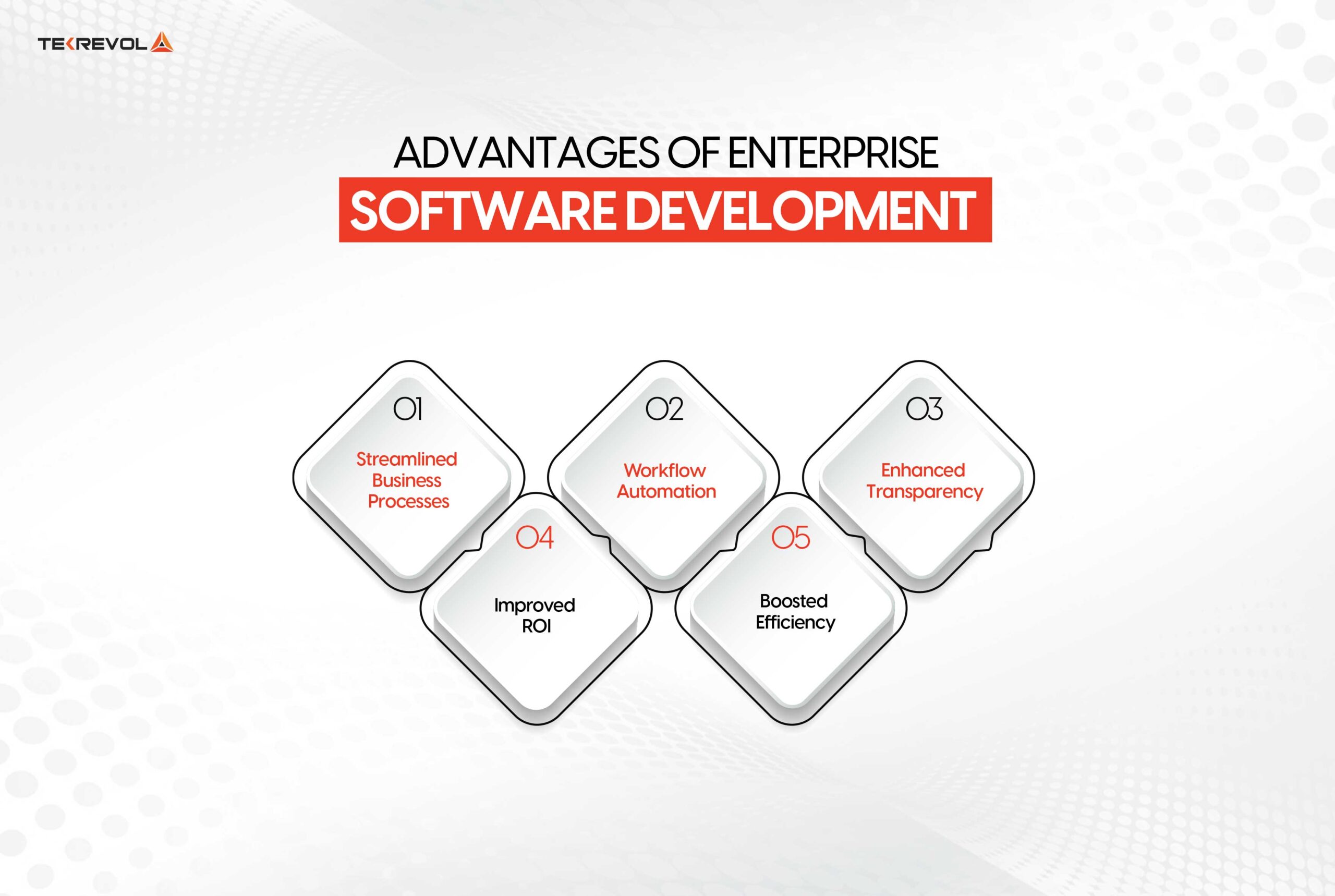
Implementing robust enterprise software offers an array of benefits that help businesses maintain a competitive edge and drive growth in today’s fast-paced digital world:
Streamlined Business Processes
Disorganized documents and general paperwork can significantly slow down a firm. Enterprise software facilitates these tasks by centralizing information and automating approval processes across businesses. Such integration helps to eliminate redundant tasks by bringing all connected teams into a common loop, making a workplace more efficient and integrated.
Workflow Automation
Data entry and report creation are examples of repetitive tasks that can need a substantial amount of staff. Enterprise software intervenes by executing these duties, allowing your team to focus on strategic goals such as expanding into new markets or releasing new products.
Though automation not only makes work easier by reducing the time required to complete a specific task, it also eliminates a factor known as bias, which can lead to incorrect results.
Enhanced Transparency
Enterprise software is an integrated system that replaces information isolation and makes available all the necessary key business indicators in real time. It helps leaders and teams to make efficient, informed decisions with more speed and efficiency and promotes organization-wide information exchange.
Improved ROI
ROI has become an important aspect for every company and enterprise software is directly impacted by faster, efficient, and errorless execution of tasks with maximum utilization of minimum resources. These efficiencies lead to reduced costs, higher sales, improved profitability, and overall growth, all of which ultimately improve revenues or the bottom line.
Boosted Efficiency
In any business, time is a crucial component that should not be taken lightly. Enterprise software offers an optimum solution to this problem by automating and managing these resources more effectively to avoid trade-offs and to do a lot more in less time.
Thus, the optimization of the workflow leads to better concentration on the key development spheres, which in turn contributes to the company’s growth and development.
Strategic Drivers Redefining Enterprise Software Solutions
The modern business environment is characterized by rapid changes and these changes influence enterprise software development nowadays. Here are some of the key drivers behind this transformation:
Moving On from Coded Structures
There is a growing perception that traditional IT structures are outdated and thus businesses are shifting to flexible web systems. Some older systems are being updated to meet today’s digital capabilities and be able to sustain sophisticated, strategic applications. Such system integration makes these systems more adaptable & digitized in the context of enterprise mobility.
Flexible and adaptive solutions
Enterprise software is gradually evolving to a more component-based model in which businesses can choose standalone components to handle certain tasks. This shift focuses on variables such as personalization and utility since the concepts offered must be embedded with cutting-edge user interfaces that assist the firm in cutting costs and adapting when faced with new challenges.
Commitment to Continuous Improvement
The notion of Kaizen, or continual improvement, is possibly the most significant in the creation of enterprise software. Companies are developing efficient software systems by combining real-time analytics with effective tools and processes.
Mobile platforms become more accessible, IoT provides greater flexibility, and cloud computing facilitates data management and key corporate information delivery through cloud integration.
AI-Driven Intelligence and Automation
AI is becoming the new generation of enterprise software with enhanced analytical ability and business performance. The combination of Artificial Intelligence and the use of machine learning in software makes it enhanced to respond, secure, and capable of processing real-time data.
With the help of intelligent automation as well as IoT, the enterprise software landscape becomes more robust, helping businesses attain better compatibility and utilization among the applications.
Technology Stack for Building Scalable Enterprise Software
Enterprise mobile app development relies on a strong combination of technologies to ensure that the resulting software is reliable and comfortable. Let’s take a glance at custom enterprise software development tools:
| Technology Category | Key Technologies | Description |
| Backend | Programming Languages: Java, C#, Python | Used for creating robust, scalable backend systems that support enterprise-grade applications. |
| Databases: SQL (MySQL, PostgreSQL, MS SQL), NoSQL (MongoDB, Cassandra) | Both SQL and NoSQL databases are used to manage complex, large-scale data storage and retrieval needs. |
|
| Frontend | JavaScript Frameworks: Angular, React, Vue.js | Frontend frameworks that deliver responsive, user-friendly interfaces for enterprise applications. |
| API Management Tools | API Gateway (AWS), Azure API Management (Microsoft) | Facilitate secure and efficient data exchange between services and manage APIs across applications. |
| Cloud Platforms | AWS, Microsoft Azure, Google Cloud Platform (GCP) | Provide flexible and scalable infrastructure to host and manage enterprise applications and data. |
| DevOps Tools | Jenkins, GitLab, Docker | Tools that enable continuous integration, delivery, and deployment, promoting efficient software management. |
Note: The selection of technologies will depend upon specific requirements and goals for your project of enterprise software.
Step-by-Step Guide to Develop Enterprise Software
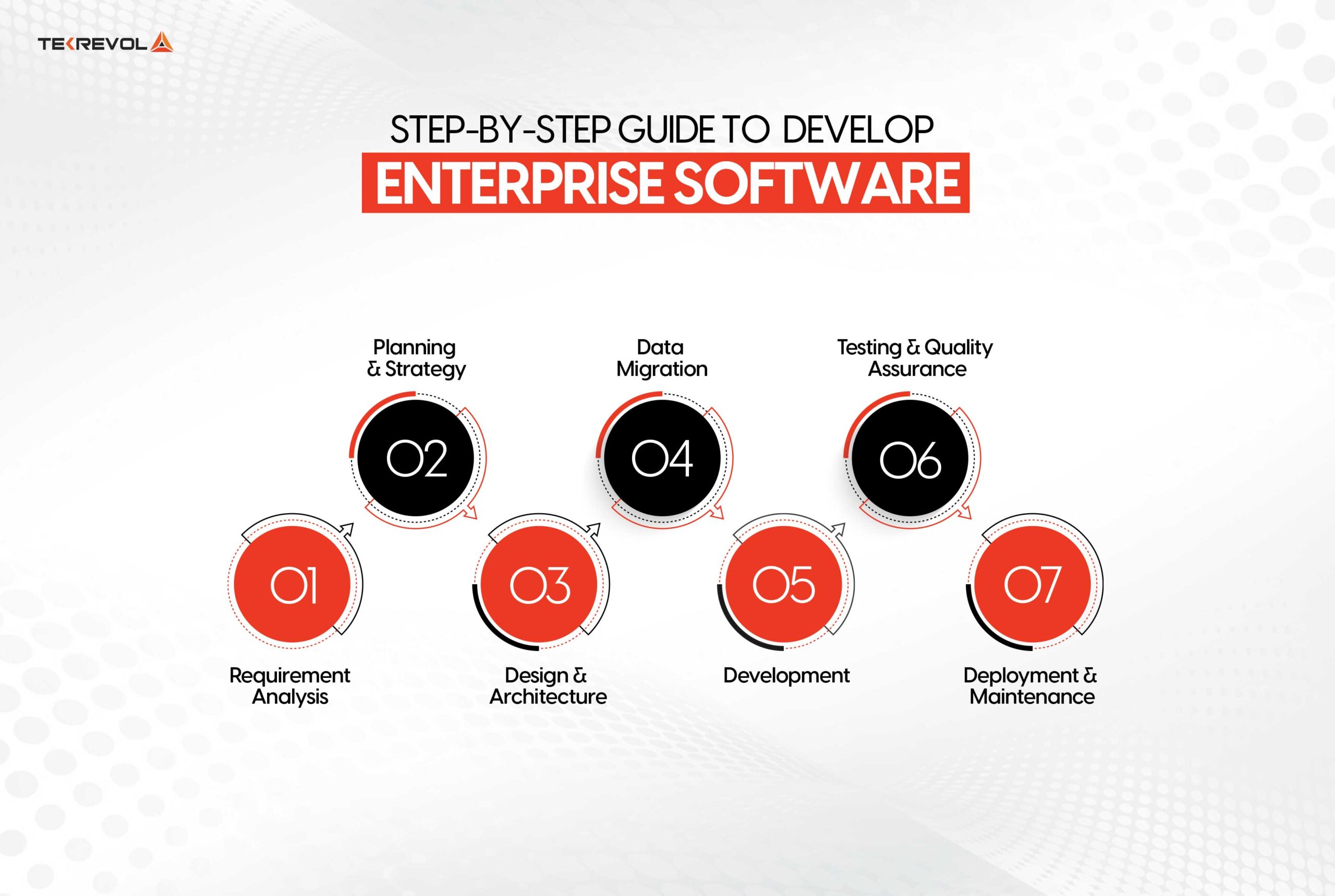
Enterprise mobile app development is not a small program, that is why its development requires effective tools for processing vast amounts of data and powerful automation. Although it is clear that the aims and objectives of each enterprise differ, the developmental process can broadly be divided into a sequence of key steps.
Requirement Analysis
This stage is aimed at collecting more detailed data about the needs and goals of the enterprise. It is important to know these requirements to align proper software design with the overall business needs and to set the fundamental groundwork of the corporate software development process.
The identification of the main characteristics and key audiences also determines how the software will provide value to the organization.
Planning and Strategy
Once the requirements are defined, a strategic vision is sketched to define the scope, schedule, resources, tools, and technologies to be used. This phase ensures that the project is in sync with the overall organizational goals, and provides guidance and deadlines that will keep the flow progressing.
Design and Architecture
During this phase, developers focus on problems such as how the product will look and how it will benefit consumers. When building a solution for an enterprise-oriented organization, it is vital to address organizational needs and make the application user-friendly while considering the company’s diverse sizes.
Data Migration
In cases where the new enterprise software is to replace an existing system, data migration emerges as a vital feature. This process requires the migration of data from the old systems to the new ones in a way that is accurate secure and interoperable. Successful data migration must ensure that there is no interruption in organizational activities and the data is not lost.
Development
This phase involves developing the software to match the designed model and construct it in line with its specifications. The development team focuses on working on essential functionalities, reliability, and connectivity to the operations of the online platform, as well as regularly inspecting the quality to determine its relevance to project goals.
Testing and Quality Assurance
Testing is done to point out problems such as the bugs that exist in the software, its usability, and performance problems that may be present. This phase also guarantees that the software is compatible with enterprise demands as well as user experience and stability in various processes. Automated as well as manual tests might be used depending on the complexity of the system.
Deployment and Maintenance
After passing through testing, the software is used within that organization. Constant updates and maintenance are essential after the deployment to address new threats and include new functionalities when necessary. It means that the software stays useful and relevant to modern business processes with such support.
How Much Does It Cost to Develop Enterprise Software?
The cost of software development is determined by a variety of factors, including the project’s complexity, the technology utilized, the number of experienced developers required, and the style of deployment. Enterprise systems have higher development costs due to their more complicated functionality, robust technological foundation, and stronger security measures.
On average, developing a custom enterprise solution usually costs between $100,000 and $1,000,000. This estimate also applies from the time the software development is planned all the way to the deployment phase. The costs may vary depending on the actual requirements of the final project within the range of values provided above.
- Curious About Your Project Costs?
- Use our cost calculator to get a precise estimate for your project.
- Calculate Now!
Partner with TekRevol For Enterprise Software Development
At TekRevol, we understand that developing and delivering high-quality enterprise software is a significant project that can transform your organization. Our corporate application services improve duties, boost staff engagement, and align with organizational goals to ensure effective discouragement and unified performance.
Being an experienced player in the industry, our enterprise software developers focus on building and deploying exclusive enterprise solutions that reflect your company’s philosophy, values, and collaborative approach. We provide adaptable software development services that evolve with your business and market situations.
A good example is ‘Stock-Ship,’ where we demonstrate our focus on creating new and improved solutions intended to address pragmatic logistical challenges. This innovative mindset aligns with the insights we have shared at Global AppSec – San Francisco 2024, a premier tech event that highlighted advancements in software development and cybersecurity, reinforcing our commitment to staying at the forefront of industry trends.
Our team comprises experts who specialize in the implementation of cloud computing, AI, and IoT technologies across an expansive industry range. Whether it’s through events like Global AppSec or our tailored enterprise solutions, we are committed to ensuring your success from initial consultation through to post-launch support.
- Take the First Step Toward Innovation
- Let us help you maximize efficiency and stimulate growth with our personalized enterprise software solutions.
- Book A Free Call Now!

 608 Views
608 Views November 20, 2024
November 20, 2024





